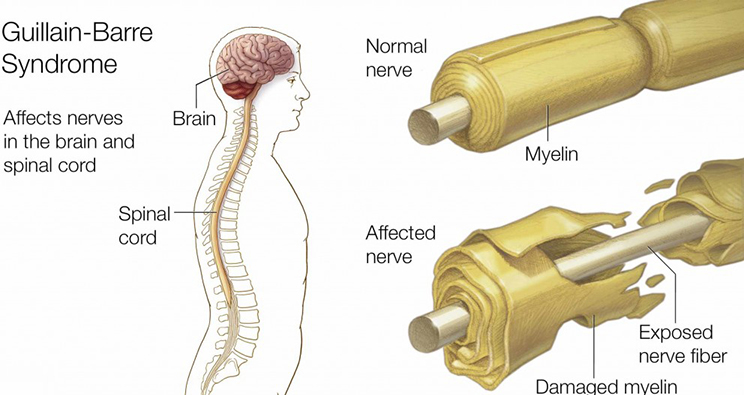Guillain–Barré syndrome also known as GBS a rapid-onset of muscle weakness caused by the immune system weakening the peripheral nervous system. The primary signs are typically changes in sensation or pain accompanying muscle weakness, occurring in the feet and hands. This frequently spreads to the arms and upper body being involved. The signs start over hours to a few weeks.
While the acute phase, the disorder can be life threatening, with about 15% developing weakness of the breathing muscles requiring mechanical ventilation. Some are affected by changes in the autonomic role nervous system, which can lead to abnormalities in heart rate and blood pressure.
Causes Guillain-Barré Syndrome
The exact cause of Guillain-Barré syndrome is unknown. Guillain-Barre syndrome (GBS) can happen to anyone, but it’s most common in people 50 years old or older. According to the Centers for Disease Control and Prevention (CDC), about two-thirds of people with Guillain-Barré Syndrome develop it soon after they’ve been sick with diarrhea or a respiratory infection.
Campylobacter jejuni infection has been associated with Guillain-Barré syndrome. Campylobacter is one of the most common bacterial causes of diarrhea in the United States. It is the most common risk factor for Guillain-Barré syndrome. It is often found in the undercooked food, especially in poultry.
The following infections are most commonly associated with Guillain-Barré syndrome:
- Influenza
- Cytomegalovirus, which is a strain of the herpes virus
- Mononucleosis
- Epstein-Barr virus infection
- Mycoplasma pneumonia
- HIV or AIDS
In rare cases, people can develop GBS days or weeks after taking a vaccination.

Symptoms of Guillain-Barré Syndrome
Symptoms of GBS normally happen over hours or days and tend to start in the feet and hands before radiating to the arms and legs.
At first, you may have:
- Numbness
- Muscle weakness
- Pins and needles
- Pain
- Problems with balance and coordination
These signs normally attack both sides of the body at the same time.
Later symptoms of Guillain-Barré syndrome
Symptoms may remain to get worse over the next few days or weeks.
Some people are only slightly affected, but others may have:
- Difficulty walking without assistance
- An inability to move the legs, arms and/or face (paralysis)
- Difficulty speaking
- Difficulty breathing
- Blurred or double vision
- Severe lower back pain
- Loss of bladder control
- Fast heart rate
- Persistent and/or severe pain
- Problems swallowing or chewing
- Constipation
Guillain-Barré syndrome habitually leads its most difficult point within four weeks. It may then continue stable for a few weeks or months before gradually improving.
Diagnosis of Guillain-Barré Syndrome
Guillain-Barré Syndrome is hard to diagnose at first. This is because the symptoms are very related to those of other neurological disorders that affect the nervous system, such as meningitis, botulism, or heavy metal poisoning.
Your physician will ask questions wherein specific symptoms and medical history.
The spinal tap tests are applied to help confirm a diagnosis:
Spinal tap
A spinal tap includes taking a small amount of fluid from your spine in the lower back. This fluid is called cerebrospinal fluid. The cerebrospinal fluid is later tested to identify protein levels. People with Guillain-Barré Syndrome typically have higher levels of protein in their cerebrospinal fluid compared to the normal level. This test is also referred to as a lumbar puncture.
Treatment of Guillain-Barré Syndrome
Anyone with Guillain-Barré Syndrome(GBS) should be admitted to a hospital for close inspection. The symptoms can suddenly get worse and can be fatal if people aren’t treated. In drastic cases, people with Guillain-Barré Syndrome can develop full-body paralysis. Guillain-Barré Syndrome can be life-threatening if paralysis attacks the diaphragm or chest muscles, preventing proper breathing.
Guillain-Barré Syndrome is an autoimmune inflammatory process that is self-limiting, and it will resolve on its own. The purpose of treatment is to reduce the severity of the immune attack and support the body functions (for example, lung function) while the nervous system recovers. Treatment may include:
Plasma exchange(Plasmapheresis)
The immune system generates proteins known as antibodies that usually attack harmful foreign substances, such as virus and bacteria. Guillain-Barré Syndrome occurs when the immune system mistakenly makes antibodies that attack the healthy nerves of the nervous system.
Plasmapheresis is indicated to exclude the antibodies attacking the nerves from your blood. Through this procedure, blood is removed from your body by a machine. This machine removes the antibodies from your blood and then restores the blood to the body.
Intravenous immunoglobulin
High doses of immunoglobulin can additionally help to block the antibodies causing Guillain-Barré Syndrome. Immunoglobulin contains normal, healthy antibodies from the donors.
Plasmapheresis and intravenous immunoglobulin are both effective. It’s up to you and your physician to decide which treatment is best for you.

Other treatments
You may need medication to relieve pain and inhibit blood clots while you’re immobile.
You must likely receive physical therapy. While the acute phase of the illness, the physical therapist will manually move your arms and legs to keep them flexible. Once you start to recover, the physical therapists will work with you on muscle strengthening and a range of activities of daily living.

